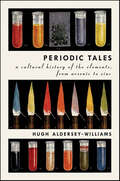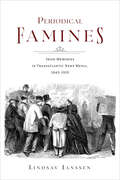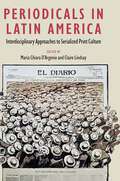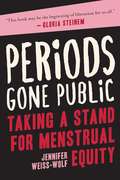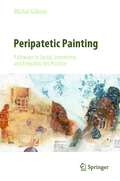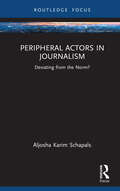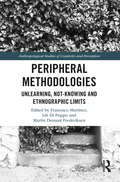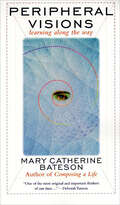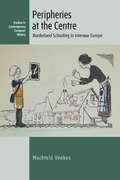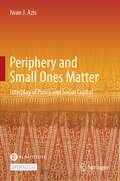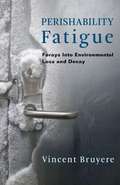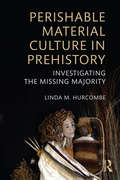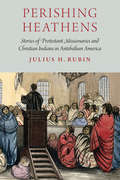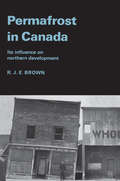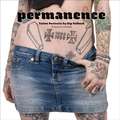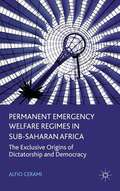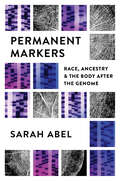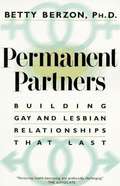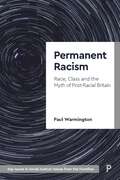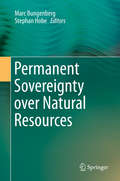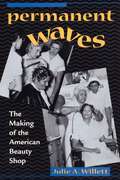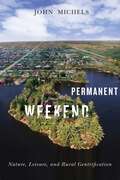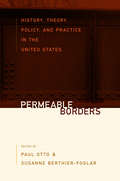- Table View
- List View
Periodic Tales: A Cultural History of the Elements, from Arsenic to Zinc
by Hugh Aldersey-WilliamsIn the spirit of A Short History of Nearly Everything comes Periodic Tales. Award-winning science writer Hugh Andersey-Williams offers readers a captivating look at the elements—and the amazing, little-known stories behind their discoveries. Periodic Tales is an energetic and wide-ranging book of innovations and innovators, of superstition and science and the myriad ways the chemical elements are woven into our culture, history, and language. It will delight readers of Genome, Einstein’s Dreams, Longitude, and The Age of Wonder.
Periodical Famines: Irish Memories in Transatlantic News Media, 1845–1919 (Irish Culture, Memory, Place)
by Lindsay JanssenLong recognized as Ireland's greatest demographic disaster in recent history, the Great Famine of 1845–1851 has shaped Irish identities around the world. From the monuments erected to commemorate its victims to the political rhetoric involving it to the novels, poems, songs, and films that it continues to inspire, the Famine remains a crucial part of Irish memory. Famine memories have also reached across history and national borders to establish links with cultural groups who were not directly connected to the Irish diaspora.Periodical Famines reveals how, within the transatlantic Irish periodical market between 1845 and 1910, Irish, Irish American, and Irish Canadian newspapers and magazines acted as carriers and shapers of cultural identities. Lindsay Janssen argues that famine memory was deployed transhistorically to help represent other crucial events in the Irish past, and periodicals used Famine recollections transnationally to give new meaning to events outside of Ireland, such as labor issues in the United States and the Second Boer War. Moving beyond individual writings to interrogate how different texts printed within a periodical issue influenced each other and affected audiences' attitudes to Irish hunger and distress, Janssen's cotextual approach reveals the intricate and sometimes divergent paths that Famine memory traveled through in the decades during and after its onset.Drawing upon a substantial corpus of creative and nonfiction periodical publications (including nearly 600 works of poetry and prose fiction), Periodical Famines is a thorough analysis of transatlantic Irish periodical culture during and after the Great Famine, demonstrating how periodicals' transmission of famine memories shaped global cultures.
Periodicals in Latin America: Interdisciplinary Approaches to Serialized Print Culture (Reframing Media, Technology, and Culture in Latin/o America)
by Claire Lindsay Maria Chiara D'ArgenioExploring how Latin American print culture has informed global exchange The first volume in English to focus on Latin American serialized print culture, Periodicals in Latin America assembles research on a diverse range of publications, including avant-garde reviews, comics, specialized journals, mass-market magazines, and political periodicals, from the late nineteenth century to the present day. In this book, scholars from a variety of disciplines examine both celebrated and little-known periodicals to demonstrate how publications supported emerging movements such as Indigenismo and feminism; undermined hegemonic conceptions of statehood and national identity; and questioned ideas about the relationship between the visual, literary, and political. Bringing Latin American print culture together with research and theories from the largely Anglophone field of periodical studies, this volume contests readings that discount the region’s periodicals, situating Latin America as a contributor to—not just a recipient of—global exchanges. Contributors also challenge the idea that periodicals are only useful for the insights they can offer into history, championing close attention to their material and materiality. The writers in this book reflect on the unique qualities and divergences of the region’s periodicals from those of other parts of the world and the need for different approaches to studying them. The volume bridges and brings into dialogue new research on print serials and their readers in the Spanish-, Portuguese-, and English-speaking worlds. Contributors: Joanna Crow | María del Pilar Blanco | José Chávarry | Jorge Catalá | Isabella Cosse | M. Paula Bontempo | Sandra Szir | Camilla Sutherland | Luis Rebaza-Soraluz | Claire Lindsay | Valentino Gianuzzi | Sofía Mercader | Rielle Navitski | Luz Ainaí Morales Pino | Maria Chiara D’Argenio A volume in the series Reframing Media, Technology, and Culture in Latin/o America, edited by Héctor Fernández L’Hoeste and Juan Carlos Rodríguez
Periods Gone Public: Taking a Stand for Menstrual Equity
by Jennifer Weiss-WolfThe first book to explore menstruation in the current cultural and political landscape and to investigate the new wave of period activism taking the world by storm. After centuries of being shrouded in taboo and superstition, periods have gone mainstream. Seemingly overnight, a new, high-profile movement has emerged—one dedicated to bold activism, creative product innovation, and smart policy advocacy—to address the centrality of menstruation in relation to core issues of gender equality and equity. In Periods Gone Public, Jennifer Weiss-Wolf—the woman Bustle dubbed one of the nation's “badass menstrual activists”— explores why periods have become a prominent political cause. From eliminating the tampon tax, to enacting new laws ensuring access to affordable, safe products, menstruation is no longer something to whisper about. Weiss-Wolf shares her firsthand account in the fight for “period equity” and introduces readers to the leaders, pioneers, and everyday people who are making change happen. From societal attitudes of periods throughout history—in the United States and around the world—to grassroots activism and product innovation, Weiss-Wolf challenges readers to face stigma head-on and elevate an agenda that recognizes both the power—and the absolute normalcy—of menstruation.
Peripatetic Painting: Pathways in Social, Immersive, and Empathic Art Practice
by Michal GliksonThis book documents the practice-led research of painting as a peripatetic art practice through travel and transient life in Australia, India, and Pakistan. Crossing disciplines of Art, Applied Anthropology, and Cultural Geography, painting is explored as a way of negotiating the uncertainties inherent in cross-cultural journeys, and the possibility of connecting with others in their lifeworlds. The ways of navigating and of making that support creativity in the field are identified, as are the multifarious conditions of the field in view of how these shaped painting, and ultimately, the consciousness of the artist through possibilities for empathy, advocacy, and activism. The book includes many images that illustrate the form which painting took in the field and the techniques employed to create these. Interactive links in the eBook edition enable the reader to view documentary films about subjects with whom the artist worked, and that illustrate the field and conditions of making. Throughout the book the reader may also engage with virtual tours of the Australindopak Archive as the art work generated by this research.
Peripheral Actors in Journalism: Deviating from the Norm? (Routledge Focus on Journalism Studies)
by Aljosha Karim SchapalsThis book addresses the transformative role that so-called peripheral actors in journalism – emerging outlets diverging from the norms fiercely held by mainstream media outlets – play in today’s news ecosystem. The author charts the rise to prominence of these actors, outlining how they have successfully managed to challenge the authority held by mainstream, legacy outlets, whose claims to be the “storytellers of our time” no longer exclusively pertain to them. Beginning by identifying these peripheral actors specifically, the book then considers whether what they do is “journalism” as traditionally conceived, what their motivations are, and why their role is important in light of journalism’s democratic function in holding power to account. Ultimately, it is argued that, despite the perceived role of peripheral actors as “deviant”, they still demonstrate a surprising degree of ideological continuity in the face of industrial disruption. Drawing on research from Australia, Germany, and the United Kingdom, Peripheral Actors in Journalism is an insightful resource for journalism and media scholars with an interest in alternative media sources.
Peripheral Methodologies: Unlearning, Not-knowing and Ethnographic Limits (Anthropological Studies of Creativity and Perception)
by Francisco Martinez Lili Di Puppo Martin Demant FrederiksenHow does peripherality challenge methodology and theory-making? This book examines how the peripheral can be incorporated into ethnographic research, and reflects on what it means to be on the periphery – ontologically and epistemologically. Starting from the premise that clarity and fixity as ideals of modernity prevent us from approaching that which cannot be easily captured and framed into scientific boundaries, the book argues for remaining on the boundary between the known and the unknown in order to surpass this ethnographic limit. Peripheral Methodologies shows that peripherality is not only to be seen as a marginal condition, but rather as a form of theory-making and practice that incorporates reflexivity and experimentation. Instead of domesticating the peripheral, the authors engage in (and insist on) practicing expertise in reverse, unlearning their tools in order to integrate the empirical and analytical otherwise.
Peripheral Visions: Learning Along the Way
by Mary C. BatesonMary Catherine Bateson, author of Composing a Life, is our guide on a fascinating intellectual exploration of lifetime learning from experience and encountering the unfamiliar. Peripheral Visions begins with a sacrifice in a Persian garden, moving on to a Philippine village and then to the Sinai desert, and concludes with a description of a tour bus full of Tibetan monks. Bateson's reflections bring theses narratives homes, proposing surprising new vision of our own diverse and changing society and offering us the courage to participate even as we are still learning.
Peripheries at the Centre: Borderland Schooling in Interwar Europe (Contemporary European History #27)
by Machteld VenkenFollowing the Treaty of Versailles, European nation-states were faced with the challenge of instilling national loyalty in their new borderlands, in which fellow citizens often differed dramatically from one another along religious, linguistic, cultural, or ethnic lines. Peripheries at the Centre compares the experiences of schooling in Upper Silesia in Poland and Eupen, Sankt Vith, and Malmedy in Belgium — border regions detached from the German Empire after the First World War. It demonstrates how newly configured countries envisioned borderland schools and language learning as tools for realizing the imagined peaceful Europe that underscored the political geography of the interwar period.
Periphery and Small Ones Matter: Interplay of Policy and Social Capital
by Iwan J. AzisThis open access book analyzes the dualism and inequality insofar as how it is manifested in interregional disparity and small enterprises. Using the case of Indonesia, the author considers how the general direction of policy should be to mitigate the effects of agglomeration forces leading towards concentration, and exploit the same forces by encouraging small businesses to operate in a cluster for collective action. The book addresses these issues by focusing on the role of interactions between policies and institutions, of which social capital is an important part. This is an open access book.
Perishability Fatigue: Forays Into Environmental Loss and Decay (Critical Life Studies)
by Vincent BruyereThe Svalbard Global Seed Vault project is an arctic archive designed to preserve the world’s agricultural biodiversity. What do it and other novel forms of storage tell us about our relationship to the future in a time of resource depletion and extinction scenarios? In this innovative book, Vincent Bruyere offers an invitation to look at the present we live in through a fresh lens: the difference between storage and burial in the age of sustainability science.Perishability Fatigue considers questions of permanence and the potentiality of retrieval, noting the tensions within our collective sense of time and finitude. Bruyere reflects on the nature and significance of perishability, asking what it means to have one’s sense of temporality engendered by seed banks and frozen embryo storage, genetically modified organisms and the “de-extinction” of species, nuclear-waste repositories, oncology, and palliative care. He draws attention to the scripts and scenarios that mediate our relations to loss and decay, preservation and conservation, emphasizing the inequalities implicit in technologies of perishability, which promise continuity in the future to some while refusing it to others. A highly interdisciplinary study, Perishability Fatigue reframes the environmental humanities and humanistic inquiry into sustainability science by developing a new language to commemorate fatigue and transience in a culture of preparedness and survival.
Perishable Material Culture in Prehistory: Investigating the Missing Majority
by Linda M. HurcombePerishable Material Culture in Prehistory provides new approaches and integrates a broad range of data to address a neglected topic, organic material in the prehistoric record. Providing news ideas and connections and suggesting revisionist ways of thinking about broad themes in the past, this book demonstrates the efficacy of an holistic approach by using examples and cases studies. No other book covers such a broad range of organic materials from a social and object biography perspective, or concentrates so fully on approaches to the missing components of prehistoric material culture. This book will be an essential addition for those people wishing to understand better the nature and importance of organic materials as the ’missing majority’ of prehistoric material culture.
Perishing Heathens: Stories of Protestant Missionaries and Christian Indians in Antebellum America
by Julius H. RubinIn Perishing Heathens Julius H. Rubin tells the stories of missionary men and women who between 1800 and 1830 responded to the call to save Native peoples through missions, especially the Osages in the Arkansas Territory, Cherokees in Tennessee and Georgia, and Ojibwe peoples in the Michigan Territory. Rubin also recounts the lives of Native converts, many of whom were from mixed-blood métis families and were attracted to the benefits of education, literacy, and conversion. During the Second Great Awakening, Protestant denominations embraced a complex set of values, ideas, and institutions known as “the missionary spirit.” These missionaries fervently believed they would build the kingdom of God in America by converting Native Americans in the Trans-Appalachian and Trans-Mississippi West. Perishing Heathens explores the theology and institutions that characterized the missionary spirit and the early missions such as the Union Mission to the Osages, and the Brainerd Mission to the Cherokees, and the Moravian Springplace Mission to the Cherokees. Through a magnificent array of primary sources, Perishing Heathens reconstructs the millennial ideals of fervent true believers as they confronted a host of impediments to success: endemic malaria and infectious illness, Native resistance to the gospel message, and intertribal warfare in the context of the removal of eastern tribes to the Indian frontier.
Permafrost in Canada
by Roger J.E. BrownPermafrost is the thermal condition of the earth's crust when its temperature has been below 32°F continuously for a number of years. Half of Canada's land surface lies in the permafrost region--either in the continuous zone where the ground is frozen to a depth of hundreds of feet, or in the discontinuous zone where permafrost is thinner, and there are areas of unfrozen ground.The existence of permafrost causes problems for the development of the northern regions of all countries extending into the Arctic. Mining operations are hindered by frozen ore which resists blasting and is difficult to thaw. Agriculture is restricted by the presence of permafrost near the ground surface which limits the soil available for plant growth. Engineering structures are also affected by the low temperatures. Ice layers give soil a rock-like structure with high strength. However heat transmitted by buildings often causes the ice to melt, and the resulting slurry is unable to support the structure. Many settlements in northern Canada have examples of structural damage or failure caused by permafrost. In the construction and maintenance of railways, buildings, water and sewage lines, dams, roads, bridges, and airfields, normal techniques must often be modified at additional cost because of permafrost.For the last twenty-five years scientific investigations and engineering projects have increased steadily in Canada's permafrost region, and it is now technically possible to build any structure or conduct any activity on the worst soils and under permafrost conditions.This comprehensive analysis of permafrost--its origin, definition, and occurrence, and the effect it has on industry and agriculture--will be invaluable to the growing number of people working in the north and to those interested in its development.
Permanence
by Kip Fulbeck Takahiro Kitamura HoritakaOnce a fringe phenomenon, tattooing is now a full-blown cultural fact. More than 40 million people in the U.S. alone have tattoos, all with unique stories about why they chose to indelibly mark their bodies. Permanence combines photographic tattoo portraits with these stories, told in the subjects' own words and handwriting. Kip Fulbeck brings together young and old of all races, religions, and political persuasions--from celebrities to suburban moms to Hells Angels. Including interviews with celebrity tattooers Kat Von D and Oliver Peck (Miami Ink), hardcore legend Evan Seinfeld, and some regular folks, Permanence is an entertaining and enlightening portrait of the tattooed population today.
Permanent Emergency Welfare Regimes in Sub-Saharan Africa
by Alfio CeramiThis book examines the relationship between development economics, social protection and democratization in the specific context of Sub-Saharan Africa. Moving existing theories of transformation into a new terrain, it sheds light on the exclusive origins of dictatorship and democracy. The book explains how development, social protection and democracy-enhancing policies have been produced by existing institutional frameworks and contingent responses to emergency events, and that these have themselves been shaped by the actions of actors and by their embeddedness in the surrounding political, economic, cultural and social environment. The book also draws attention to the most relevant institutional and social mechanisms, with associated elite strategies and power politics relations in the creation of politically-induced conflicts. In doing so, it highlights the important role of welfare institutions in the reduction and reproduction of vertical and horizontal inequalities as well as their repercussion in the emergence of social conflicts.
Permanent Exhibit (American Reader #31)
by Matthew VollmerMatthew Volmer fuses the insight of extended meditation with the immediacy of social media in his new collection Permanent Exhibit. These collage-style essays experiment with stream-of-conscious musings as Vollmer opens a browser window into his own mind: letting his thoughts wander through a fast-forward montage of flying snakes, mass shootings, emojis, pop stars, stargazing, ghosts, circuses, and a hundred other things. Full of keen observations and unexpected insights, Permanent Exhibit reclaims the art of letting one’s mind wander in the age of the status update.
Permanent Markers: Race, Ancestry, and the Body after the Genome
by Sarah AbelOver the past twenty years, DNA ancestry testing has morphed from a niche market into a booming international industry that encourages members of the public to answer difficult questions about their identity by looking to the genome. At a time of intensified interest in issues of race and racism, the burgeoning influence of corporations like AncestryDNA and 23andMe has sparked debates about the commodification of identity, the antiracist potential of genetic science, and the promises and pitfalls of using DNA as a source of "objective" knowledge about the past.This book&8239;engages these debates by looking at the ways genomic ancestry testing has been used in Brazil and the United States to address the histories and legacies of slavery, from personal genealogical projects to collective racial politics. Reckoning with the struggles of science versus capitalism, "race-blind" versus "race-positive" public policies, and identity fluidity versus embodied experiences of racism, Permanent Markers seeks to explain why societies that have broadly embraced the social construction of race continue to search for, and find, evidence that our bodies are indelibly marked by the past.
Permanent Partners: Building Gay and Lesbian Relationships That Last
by Betty BerzonPsychologist offers counseling from her practice with long-term gay and lesbian couples. Topics, such as compatibility, internalized homophobia, communication, power and control issues, jealousy, fair fighting, money, sex, family, writing wills, etc, are all covered.
Permanent Racism: Race, Class and the Myth of Postracial Britain
by Paul WarmingtonRacism has no place in our society, we are told. In fact, its role is crucial but today public debate on race in Britain is constrained by a facile postracialism. Its features are colourblind narratives, an ‘anti-antiracist’ discourse and erasure of Black working class identities. This book examines and challenges the marginalisation of critical race analysis in debates on social justice. It reconceptualises Critical Race Theory from a British standpoint, foregrounding the concept of ‘permanent racism’ and its importance in understanding race as a fully social relationship. Highlighting the need to decolonise public debate and antiracism itself, the book provides an essential resource for academics, students and activists who wish to decolonise public debates on racism, social class, education and social policy.
Permanent Sovereignty over Natural Resources
by Marc Bungenberg Stephan HobeFifty years after the adoption of the Declaration on Permanent Sovereignty over Natural Resources by the General Assembly of the United Nations in December 1962, this volume assesses the evolution of the principle of permanent sovereignty over natural resources into a principle of customary international law as well as related developments. International environmental and human rights law leave unresolved questions regarding the limitations of this principle, e. g. extraterritorial and international influences such as the applicable criminal and tort law, as well as the extraterritorial and international promotion of good governance, including transparency obligations.
Permanent Waves: The Making of the American Beauty Shop
by Julie Ann WillettThroughout the twentieth century, beauty shops have been places where women could enjoy the company of other women, exchange information, and share secrets. The female equivalent of barbershops, they have been institutions vital to community formation and social change. But while the beauty shop created community, it also reflected the racial segregation that has so profoundly shaped American society. Links between style, race, and identity were so intertwined that for much of the beauty shop's history, black and white hairdressing industries were largely separate entities with separate concerns. While African American hair-care workers embraced the chance to be independent from white control, negotiated the meanings of hair straightening, and joined in larger political struggles that challenged Jim Crow, white female hairdressers were embroiled in struggles over self-definition and opposition to their industry's emphasis on male achievement. Yet despite their differences, black and white hairdressers shared common stakes as battles were waged over issues of work, skill, and professionalism unique to women's service work. Permanent Waves traces the development of the American beauty shop, from its largely separate racial origins, through white recognition of the "ethnic market," to the present day.
Permanent Weekend: Nature, Leisure, and Rural Gentrification
by John MichelsNorth of the heart of Ontario’s scenic Muskoka District are the Almaguin Highlands, a loosely organized collection of villages, townships, and municipalities. In the mid-1800s, the region was home to loggers and farmers, as well as seasonal residents in simple cottages and camps. Since then, the impact of economic globalization and government policies has transformed the countryside into a luxurious recreational, residential, and tourist destination. John Michels investigates change in the Almaguin Highlands, exploring the modern faces of cottaging, tourism, agriculture, forestry, and economic development initiatives. He shows how years of neoliberal policies have displaced agriculture and logging as the principal sources of employment in northern Ontario, generating tension and unexpected alliances between tourists, residents, loggers, farmers, developers, and governmental officials over the proper uses and meanings of rural space. The repercussions of this new service-oriented countryside include increased youth outmigration, decreased full-time employment opportunities, and an ever-growing gap between the rich and the poor. A rich and detailed study based on long-term interviews and fieldwork, Permanent Weekend critically explores the catalysts and outcomes of gentrifying rural areas.
Permanent Weekend: Nature, Leisure, and Rural Gentrification (McGill-Queen's Rural, Wildland, and Resource Studies)
by John MichelsA timely examination of the causes and consequences of rural gentrification.
Permeable Borders: History, Theory, Policy, and Practice in the United States
by Paul Otto Susanne Berthier-FoglarIf the frontier, in all its boundless possibility, was a central organizing metaphor for much of U.S. history, today it is arguably the border that best encapsulates the American experience, as xenophobia, economic inequality, and resurgent nationalism continue to fuel conditions of division and limitation. This boldly interdisciplinary volume explores the ways that historical and contemporary actors in the U.S. have crossed such borders—whether national, cultural, ethnic, racial, or conceptual. Together, these essays suggest new ways to understand borders while encouraging connection and exchange, even as social and political forces continue to try to draw lines around and between people.
